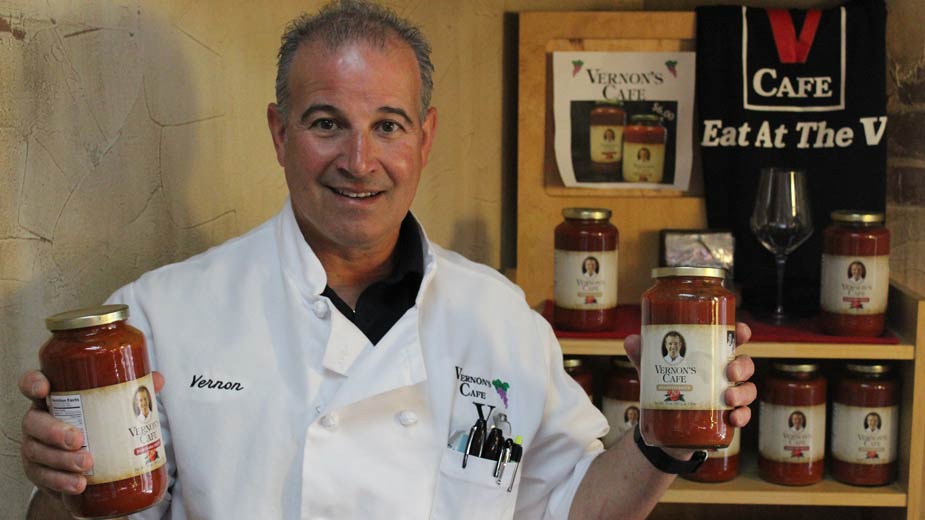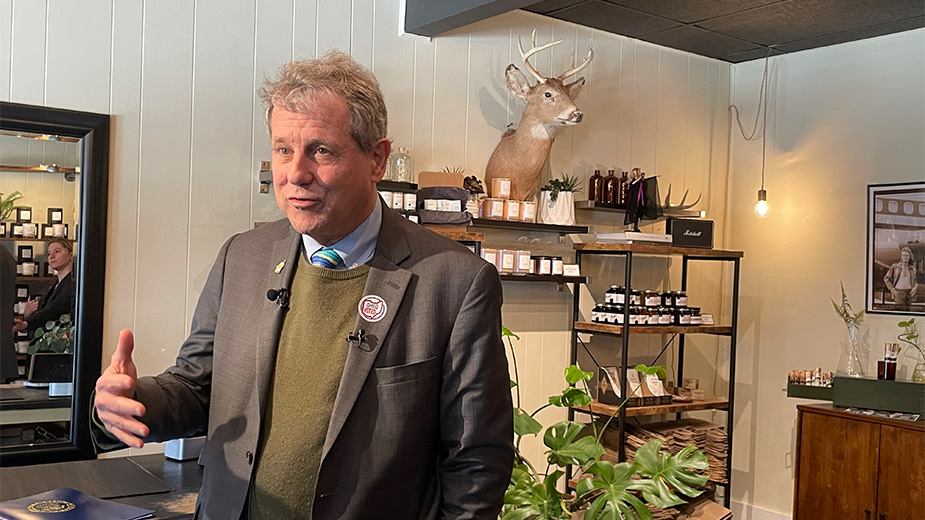Sample their Menus at Home and Restaurants
YOUNGSTOWN, Ohio — It’s the middle of a Thursday lunch rush and Fred Ghossain is running laps around his restaurant taking care of customers. For an hour or more every day, he and his employees are caught in a frenzy of activity at Ghossain’s Mid-East Bakery. But that’s just the customers in the restaurants in Boardman and Niles. Other customers, shopping at places such as Giant Eagle or Rulli Bros., have already been taken care of.
“Giant Eagle gets a lot more people than we do, no matter how many people we get inside,” Ghossain says with a laugh.
At 4 a.m. every day, Ghossain’s son, Joe, starts making pita, flatbread and pastries, making enough to supply the two restaurants and supermarkets as well as fill the orders to be shipped out. For stores within 30 miles, Ghossain’s delivers directly. Outside that radius, it ships via UPS or LTL Frozen Carriers.
By the time the lunch rush hits, the customers looking for pita and flatbread in stores have their choice of the fresh stock.
Ghossain began selling his breads in stores – the first was the now-closed Joseph’s Market in New Castle – in the mid-1970s, just a few years after opening the first restaurant. Now, the breads are sold throughout the Mahoning Valley and wholesale to restaurants and golf clubs as far as Florida. Joe Ghossain estimates the retail-wholesale split is around 60/40.
“We’ve had quite a few growing pains. We’ve gotten busier and busier with retail food. … But we can handle any amount of bread that comes up,” Fred Ghossain says. “Instead of doing a thousand pounds of flour, we have the capacity to do 5,000 pounds. It’s labor-intensive, though most of it’s done by machine. Joe can keep the line going by himself with two people packing.”
Ghossain’s isn’t the only restaurant in the area whose products are available off the shelves. Belleria Pizza owner Bill Liberato began selling its pasta and marinara sauces in quarts out of the restaurant when he began franchising in 1996. A year later, sales were good enough that he began bottling it to sell in his restaurants and ship to stores.
“One of the things we found out very quickly is that consistency is the most important thing you can have in a restaurant. To try to idiot-proof some of the franchising, we decided we’d manufacture the sauce,” he says.
After the sauce restaurants needed had been packaged and delivered, what was left was bottled and sold.
For Vernon Cesta, who started his own brand of sauce in 2010, stocking supermarket shelves was the result of customer demand. He partnered with Summer Garden Foods, which takes care of producing, packaging and distributing the sauce.
Most important for him is that what’s on the shelf is identical to what’s served on the plates in his restaurants, Vernon’s Café and V2 Wine Bar Trattoria. While the recipes vary ever so slightly, the sauces taste exactly the same, he says.
“[They] bring back samples so we can compare the sauce we made fresh to theirs,” he says. “Sometimes you may have to take something out because when you do it in such big batches, sometimes you … need a little more. As far as the main ingredients, the recipe is still intact.”
At Ghossain’s, the father-son team say they change their recipe only when the atmosphere requires them to.
“Winter months change it a little because of the cold,” Joe Ghossain says. “And the summer months is a little softer because of the humidity. You have to adjust slightly.”
To better control the quality of the sauce sent his franchisees and to stores, Liberato recently moved production to a site in Hubbard the franchisee operates there.
“They are manufacturing our sauce now and it is a direct subsidy of Belleria,” he says. “It’s so much more relaxing for me to know that there isn’t Joe Blow in a factory just throwing stuff in.”
At first, he continues, franchisees showed some concern about stocking jars of sauce in their stores. They were worried that customers, rather than coming in and ordering a plate of spaghetti, would just buy the sauce and leave.
“The person who comes in to buy sauce is buying sauce whether it’s Belleria or not and they’re not buying the pasta from you anyway,” the owner says. “By having the choice, you’re getting more people. If it’s good, you gain another area in your customer base.”
Selling sauce in grocery stores isn’t a major source of income for either restaurant, Cesta and Liberato agree. The more time spent dealing with that, they say, the more time they spend away from their restaurants.
“It’s name recognition right now. You’re not going to get rich off it,” Cesta says. “The only way you’re going to get rich is if you’re selling sauce nationwide and then it becomes a volume thing.”
Regardless, brand recognition remains a way to draw new customers. Liberato says he’s had customers come to his restaurant in Cornersburg after buying his sauce in stores, as has Cesta. At Ghossain’s, flatbread has been shipped to all 50 states.
“One person saw us in a store in Bettendorf, Iowa. Until that time, I had never heard of it. He bought the bread and he likes to treat his neighbors,” Ghossain says. “He gave it out and probably every family in Bettendorf, Iowa, called us to order our bread.”
To get into stores, though, is not always an easy task. Kitchens where the food is prepared have to be inspected by county, state and federal officials. Labels have to be designed that include nutrition information as required by the Food and Drug Administration. Summer Garden took care of that for Cesta, he says.
When Liberato first sold his sauce, then-producer Sharon Packing took a small batch to Penn State to be analyzed so all ingredients could be listed on the label.
“Anything that’s in there has to be listed. There were a few things I was thinking, ‘Mustard seed? Where’d they get that from?’ But it was something that went into the raw product,” Liberato says with a hint of surprise. “It’s nothing to sneeze about. You can get in a lot of problems if you don’t do all that right.”
After that, the task of getting into stores remains. Belleria sticks mainly to local stores – Rulli Bros., Nemenz IGA and some Italian specialty shops – while also selling on Amazon through Youngstown Wholesale Grocery Co. Cesta, meanwhile, is in supermarket chains such as Giant Eagle.
“We like to go into stores and push our sauce for it to sell,” he says of getting into new shops. “You go into an industry where you’re foreign and they see so many other sauces and advertisements. You have to go out, let them try it, give them a deal and it sells.”
Cesta is working on getting frozen meatballs into stores as well. That process works differently than selling sauces, he says, because freezer space is much more limited than shelf space for dry goods.
“They demand a premium to get [freezer] space. If it doesn’t go in 30 days, they have to throw it out,” he says. “So if you don’t market right or price it right, it may be 30 days and the product isn’t moving and they want you out.”
Many stores also require liability insurance, Ghossain says, and some states, such as Pennsylvania, require certification from the state department of agriculture before a product can be sold in the state.
While the product customers take home from the store doesn’t always come directly from the kitchens of the three restaurants, the restaurateurs say that they take the same pride in their recipes. It’s just as important for a customer, regardless of whether he eats at home or eats out on Friday night, to have a nice meal.
“You’re proud of something you’ve created,” Ghossain says. “It’s not all about money. It’s also about making a product you’re proud of.”
Pictured: Vernon Cesta partnered with Summer Garden Foods to get his restaurant’s sauce into about 80 stores in the area.
Copyright 2024 The Business Journal, Youngstown, Ohio.



